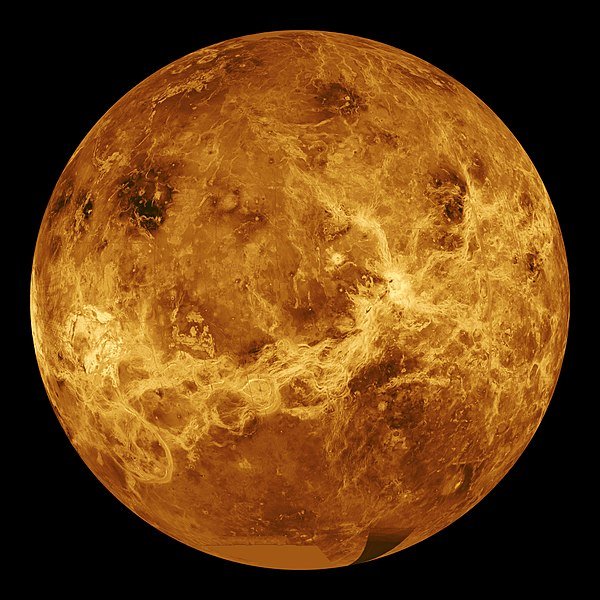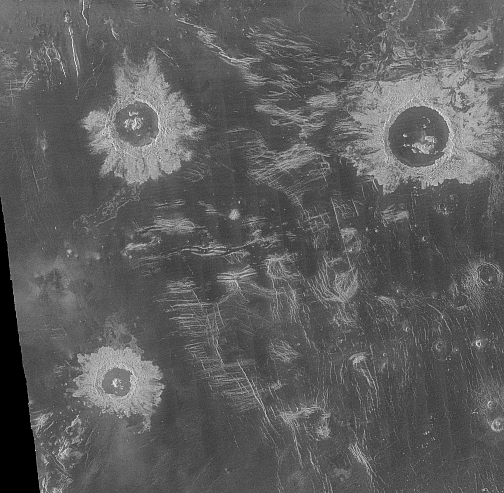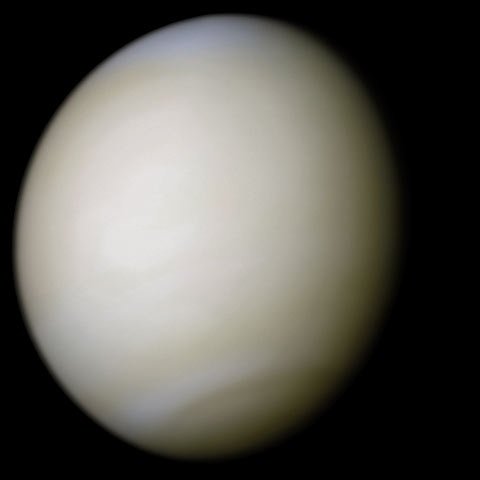Life's Role in Geology Part 1: How to Stop an Exploding Planet
300-600 million years ago, Venus exploded. Well, not the whole thing, but its entire crust cracked open and covered the entire surface in lava. As far as catastrophic planetary events go, there's really not much comparable in the history of our solar system.

A radar image of Venus' surface without its atmosphere. [Image source]
It's hard to say exactly how severe the global resurfacing event was, but the most likely scenario is that the surface shattered and sank into the mantle, resulting in a global magma ocean covering Venus. This occurred because Venus lacks plate tectonics like Earth has- instead the entirety of Venus is covered in a single rigid crustal shell. Over time, pressure and stresses build up along the shell, and since it can't move around to relieve the stress like tectonic plates can, the stress eventually builds to the point where it overwhelms the crust.
How do we know that Venus' crust is only ~500 million years old? By counting the craters. We know the rates that meteors have struck other bodies throughout the solar system, so we can fairly effectively date a planet's crust just by counting craters. Venus has very, very few. Our planet has a similarly low number, but that's due to plate tectonics and our ample erosive processes. Other planets with comparably low erosion rates to Venus have much more, and we've found ways to compare their ages.

Three of the Venus' rare craters. [Image source]
Venus is even more volcanically active than Earth- it has volcanoes numbering in the hundreds of thousands or higher, as well as massive flood basalt plains. (Locations where the crust cracks and pours out basaltic mantle magma- this happens on Earth as well. Notable locations are the Deccan Traps in India, the Siberian Traps, and the Columbia River Flood Basalts in Oregon.) The volcanism likely acts as a pressure relief valve for Venus, but only for so long- eventually, the stress will overwhelm Venus' crust. It seems that plate tectonism is the best solution for rocky planets the size of Earth and Venus to avoid this fate.

Venus with its clouds. [Image source]
So why doesn't Venus have plate tectonics? The most likely answer? Because Venus lacks water. Water essentially acts as a lubricant for plate tectonics- its status as a volatile makes rocks more ductile under heat and pressure. So why does Venus lack water? Because all of its oxygen is locked up either in its rocks or as atmospheric CO2. So what let Earth keep its water when Venus couldn't?
Life.
Specifically, oxygenating bacteria. They break up the CO2 for energy, releasing free oxygen into the atmosphere, leading to the formation of more and more water. It's the very existence of those bacteria (and now plants as well) that help sustain plate tectonics. And while Venus likely had a shorter available timespan to develop oxygenating life, due to its closer position to the sun (among other factors), the role of life in plate tectonics really helps give you a beginning of a sense about exactly how important life has been to the history of this planet.
************************************
Bibliography:
https://en.wikipedia.org/wiki/Geology_of_Venus#Global_resurfacing_event
https://en.wikipedia.org/wiki/Geodynamics_of_Venus
http://www.nature.com/news/2010/100830/full/news.2010.435.html
So what you want to say is our oceans are the reason we are safe from deadly earthquake... A very informative post thanks...
They're likely the reason why the planet doesn't periodically shatter and cover itself with molten magma. A wee bit deadlier than an earthquake.
I guess the role of the atmosphere is also important in preventing many rocks to get to the ground, isn't it?
Definitely! In fact, Venus' immensely thick and corrosive atmosphere prevents even more meteors from hitting its surface than Earth's atmosphere does- you can only really make useful comparisons above a certain meteor size due to that.
Okay I was surprized the atmosphere effect was not included in the calculations. But it was. I am feeling way better now ;)
Interesting to think our life relies on water, yet water relies on life.
Nice way of putting it!
umm very interesting stuff and fascinating. I wonder if we'll ever make it there :)
We've been sending probes to Venus since the 1970s, but I imagine it will be a while until we actually visit- the atmosphere is too caustic for us to land and survive, even in ships.
Yes I meant visit it. Would be fascinating but I personally think we should discover the oceans of this planet first, if we put the money we have put in space in the oceans. We need to explore and save our oceans before they are completely radiated by Fukushima. To me that is the priority :)
All the radiation in Fukushima wouldn't be enough to irradiate our oceans even if it had been dumped entirely into the water, rather than capped- don't get me wrong, it's bad, and it getting into the food chain sucks, but it's not anywhere near that bad.
This also gets into the whole issue with only having one priority- past a certain point, which we admittedly haven't passed yet, further effort on a cause can start seeing diminishing returns. It doesn't make a ton of sense for us to just focus on one thing, especially since technological advances in one field often synergize with those in another, which is often the case with ocean and space research.
Fukushima radiation has reach the US coast and Is causing a lot of damage.
I understand yes, I don't mean completely stop anything else by prioritising exploration of the oceans. You can still do more thing one thing at a time just focus on one thing more for the time being.
I like how you explain how we know things, instead of just stating facts.
I'd like more clarification about the bacteria and water thing. Surely water preexisted bacteria. So what you're saying is bacteria (or life) helps maintain and/or increase water? If there was no life, would the water slowly evaporate? Would be a lot less?
It's interesting how life requires water, and the activity of living creates the necessary ("watery") environment for further living! There might be some evolutionary advantages there for organisms that create what they need to live. And a lesson for us, who appear to be destroying what we need to live!
Venus probably had some water too- oxygen just has a tendency to want to lock itself up in rocks and CO2 in the long run. Life just helps keep it from doing so. So it's a matter of maintaining water rather tham creating it, you're right.
And yeah, there are always lessons to be learned from history, whether human or natural.
I learned something new about Venus today, and that was really fascinating!
Thanks for sharing!
Venus is a super cool planet!
In a sense, the planet shifts as life processes constantly affect changes to its environment. Does the Earth exist as it does due to the creatures on its surface, or do the creatures exist as they do because of the planetary conditions?
Both! When it comes to complex systems, the ways they interact tend to be reciprocating and interdependent. You can't really have a chicken or an egg.
img credz: pixabay.com
Nice, you got a 4.0% @minnowbooster upgoat, thanks to @mountainwashere
Want a boost? Minnowbooster's got your back!
Thanks for share this awesome tips
Tips on what? Avoiding having the planet explode?
Thanks for reply....Sorry i forgot your post i cannot write right thing
Very interesting post is good and informative.
I'm glad you found it interesting, but your post does feel a little spammy. The community does tend to reward you for better comments, and disapprove of more spam-feeling comments. In the future, you might wish to engage a little more with the post- I'd like to hear what you found interesting about it, for instance.